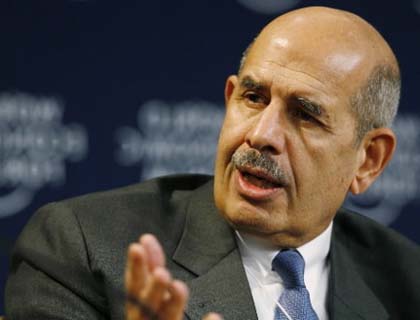NEW YORK — Former chief UN nuclear inspector Mohamed ElBaradei suggests in a new memoir that Bush administration officials should face international criminal investigation for the “shame of a needless war” in Iraq.
Freer to speak now than he was as an international civil servant, the Nobel-winning Egyptian accuses U.S. leaders of “grotesque distortion” in the run-up to the 2003 Iraq invasion, when then-President George W. Bush and his lieutenants claimed Iraq possessed doomsday weapons despite contrary evidence collected by ElBaradei's and other arms inspectors inside the country.
The Iraq war taught him that “deliberate deception was not limited to small countries ruled by ruthless dictators,” ElBaradei writes in “The Age of Deception,” being published Tuesday by Henry Holt and Company.
The 68-year-old legal scholar, head of the International Atomic Energy Agency (IAEA) from 1997 to 2009 and recently a rallying figure in Egypt's revolution, concludes his 321-page account of two decades of “tedious, wrenching” nuclear diplomacy with a plea for more of it.
“All parties must come to the negotiating table,” writes ElBaradei, who won the Nobel Peace Prize jointly with the IAEA in 2005. He repeatedly chides Washington for reluctant or hard-line approaches to negotiations with Tehran and Pyongyang.
He is harshest in addressing the Bush administration's 2002-2003 drive for war with Iraq, when ElBaradei and Hans Blix led teams of UN inspectors looking for signs Saddam Hussein's government had revived nuclear, chemical or biological weapons programs.
He tells of an October 2002 meeting he and Blix had with Secretary of State Colin Powell, National Security Adviser Condoleezza Rice and others, at which the Americans sought to convert the UN mission into a “cover for what would be, in essence, a United States-directed inspection process.”
The U.N. officials resisted and their teams went on to conduct some 700 inspections of scores of potential weapons sites in Iraq, finding no evidence to support the U.S. claims of weapons of mass destruction.
In his own memoir, published last November, Bush still insisted it was right to invade to remove a “homicidal dictator pursuing WMD.” But the ex-president also wrote of a “sickening feeling” when no arms turned up after the invasion, and blamed an “intelligence failure” for the baseless claim, a reference to a 2002 U.S. intelligence assessment contending WMD were being built.
But that assessment itself offered no concrete evidence, and Bush and his aides have never explained why the U.S. position was not changed as on-the-ground UN findings came in before the invasion.
ElBaradei cites examples, including the conclusion by his inspectors inside Iraq that certain aluminum tubes were designed for artillery rockets, not for uranium enrichment equipment to build nuclear bombs, as Washington asserted. (AP)

